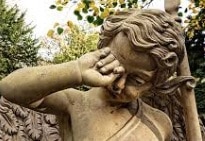The first thing we are going to do is know the etymological origin of the term rub. In this case, we can state that it derives from French, specifically from the verb "frotter" which, in turn, emanates from Latin. Specifically, it comes from Vulgar Latin "frictare", which is the frequentative form of the verb "fricare", which is synonymous with "scouring".
The verb refers to making something pass repeatedly over another element or surface, applying more or less force.
 For example: "To make this preparation, we must rub the ripe tomato on a slice of bread and then add olive oil, salt and pepper" , "When applying sunscreen, you should not rub too much to allow the skin to absorb the cream» , «After scrubbing with a brush for several minutes, I finally managed to remove the sauce stain from the tablecloth» .
For example: "To make this preparation, we must rub the ripe tomato on a slice of bread and then add olive oil, salt and pepper" , "When applying sunscreen, you should not rub too much to allow the skin to absorb the cream» , «After scrubbing with a brush for several minutes, I finally managed to remove the sauce stain from the tablecloth» .
Among the synonyms of rubbing are words such as scrub , rub, rub, rub, sand, grind or ludir, among others.
The action of rubbing is often done frequently in everyday life. If a person is cold, for example, they will probably decide to rub their hands to warm themselves : in this way, they rub one hand with the other to generate heat. To look through a foggy window, on the other hand, you have to rub the glass , either with your hand or a cloth, to remove the moisture. When someone's eyes itch, they may rub their eyelids with their fingers to try to find relief.
In addition to everything indicated, we cannot ignore that one of the best-known advertising slogans in Spain in the history of advertising uses precisely the word that concerns us now. We are referring to "Rubbing is going to end", which came to present back in 1982 the launch of a detergent that responded to the name WIPP Automatics.
With that slogan, what the company wanted to convey to its potential customers was that this cleaning product ensured that the clothes washed in the washing machine came out perfectly clean, even those with the most stains and dirt, and without having to scrub them repeatedly. previous form.
In the context of art, frottage is the technique created by Max Ernst in the 1920s to create impressions of objects. The method consists of placing a sheet on the object to be printed (a coin, for example). Then, you have to rub a pencil over said sheet, so that an impression can be generated that will have, in this case, the texture and shape of the coin.
Within the sexual sphere we have to highlight the existence of a practice that is based on the term in question. We are referring to the so-called frottage, which consists of two people rubbing certain parts of their body and even their sexual organs with their clothes on. It is a way to enjoy sexual contact but without intercourse.
